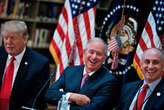When invited to speak to a group of NASA engineers, I was asked to address just two questions:
- What was the single factor contributing most to my career satisfaction at Johnson & Johnson?
- What was the primary driver of my creativity and innovation success?
Intrigued, I accepted the invitation, believing the NASA leadership had a particular reason for posing such targeted questions. I began preparing by reflecting on how I might share insights with such a respected group of engineers. Through self-exploration and research, I realized that the answer to both questions was the same: gratitude.
Lessons from childhood
My childhood was anything but ordinary. As the second oldest of 14 children raised in a 900-square-foot home with a father shaped by his childhood trauma, we were poorer than we realized but blessed with an amazing mother. Despite the challenges, Mom was a gifted teacher who equipped her children well for life. When she mentioned having 14 children, strangers would often respond with condescending pity, “God bless you.” Her automatic response was, “He has, 14 times.”
We never had enough light bulbs, yet there was always one working bulb. After dinner and homework in the kitchen each night, we moved to the second-floor bedrooms. As Mom raised her apron to remove that one hot bulb from the socket in the kitchen, we huddled around and clung to her dress, following her upstairs until she installed the bulb in the center hall. During this nightly migration, she would say, “Do you know how lucky we are to have this light bulb? Do you know how many children go to bed without one? Let’s be thankful for this light bulb.”
The light bulb story represents just one of the countless lessons Mom intuitively taught us about gratitude. She often quoted Henry David Thoreau: “I make myself rich by making my wants few.” Her central message imparted a priceless lesson: Gratitude is essential to happiness and well-being.
Gratitude: Rocket fuel for my career
Throughout my 25-year career as VP of Engineering at Johnson & Johnson, creativity and innovation guided my journey through challenges and successes. I have earned 15 U.S. patents, many of which have transformed industries or markets. At 18, I invented infant disposable diapers, which today is a $60 million annual revenue business. Despite taking strategic risks and embracing change, an often-underestimated practice fueled my journey: gratitude.
Here are a few lessons I have learned along the way about how gratitude can boost your career satisfaction and success.
Expressing gratitude for others helps foster stronger work relationships:Early on, I learned that a simple “thank you” could accomplish more than polished presentations and comprehensive reports. Genuine appreciation fostered relationships built on trust and respect. In collaborative environments, gratitude reduces friction and facilitates smoother interactions. Colleagues who felt valued reciprocated by investing in shared goals, which, in turn, fueled creativity and innovative thinking.
Gratitude helps you reframe challenges: Gratitude also reshaped my approach to challenges. In a world where the status quo is constantly under threat, setbacks are inevitable. Instead of dwelling on failure, I sought lessons hidden within each disappointment. Gratitude shifted my focus from what went wrong to what could be learned, cultivating resilience and opening doors to creative problem-solving.
Gratitude gives you a deeper sense of purpose in your work: Appreciating small daily wins, I uncovered the intrinsic rewards of my efforts. This awareness nurtured a genuine passion that fueled long-term engagement and motivation. During career transitions—whether promotions, role changes, or organizational challenges—I adapted with a heart anchored in gratitude, finding meaning and potential in every shift.
Practicing gratitude boosts your leadership skills: Beyond personal growth, gratitude became a leadership philosophy. By recognizing others’ contributions, I aimed to cultivate a culture where gratitude infused the workplace. Celebrating successes, both big and small, encouraged others to take ownership and pride in their work. This collective appreciation transcended individual performance and strengthened team spirit. As shared gratitude grew, so did our ability to innovate collaboratively as an organization.
Gratitude helps combat stress: Gratitude also provided a powerful counterbalance to stress. The relentless demands of the corporate world required a centered and focused mindset. By acknowledging achievements and remaining thankful for challenges that pushed me beyond my comfort zone, I managed stress more effectively, remaining open to new possibilities.
Reflecting on my career, I realize gratitude was not just an accessory to success—it was integral to it. Practicing gratitude enabled me to nurture a network of supportive relationships, foster continual learning, and inspire a constant flow of creative energy. The rewards were tangible, and the lessons were enduring.
As I prepared for the NASA presentation, I recognized that gratitude was not merely a personal virtue. It was a powerful force propelling my career to heights I had never imagined. I shared with the NASA engineers my belief that gratitude, as a mindset, can remarkably broaden your perspective. Cultivating gratitude and appreciating life’s abundance naturally opens doors to exploring new possibilities and unconventional ideas. I shared my conviction that gratitude will remain my guiding star.
As I mentor emerging leaders and innovative thinkers, I encourage them to harness the power of gratitude—not as a passive emotion but as an active strategy for success. By cultivating gratitude, we empower ourselves and others to achieve remarkable feats, transforming workplaces into thriving communities characterized by creativity, innovation, and shared achievement.










No comments